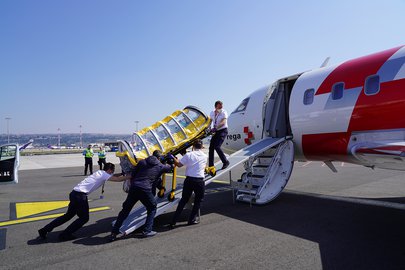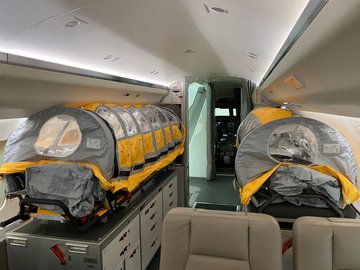The organisation of repatriations during the Corona pandemic poses major challenges for Rega’s Operations Centre. All over the world, entry and exit regulations are constantly changing, with the result that before each repatriation mission, the flight coordinators have to find out from the authorities responsible whether and under what conditions the Rega crew can enter the country and also to ensure that the patient is permitted to leave. Despite this time-consuming task, in March the three Rega ambulance jets were very frequently in the air: around 50 patients who had been injured or become ill while they were abroad were flown back home. Among those repatriated were patients from Brazil, South Africa, Cambodia and Marseilles.
Assistance by the FDFA for repatriation from St. Martin
During the last days and weeks, Rega’s jet crews have transported over a dozen confirmed or suspected COVID-19 patients on board the ambulance jets. The organisation of some of these Corona missions proved to be particularly complex, as the case of the repatriation of a Swiss couple from the Caribbean island of St. Martin on Thursday, 2 April 2020 shows. The couple were in hospital in the French part of the island and had to be transported by ambulance across the closed border to the airport, which is situated on Dutch territory. It was only thanks to the assistance of the Federal Department of Foreign Affairs (FDFA), which intervened with the embassies of both countries, that the necessary permits for the border crossing were obtained. Conversely, Rega is supporting the FDFA with the expertise of its Jet Operations Centre and is part of an FDFA crisis team that is currently coordinating the largest ever repatriation operation for Swiss tourists and business travellers.
Transport of COVID-19 patients in the patient isolation unit
For the majority of repatriations of COVID-19 patients, Rega uses the patient isolation unit (PIU), which it designed in 2015 in collaboration with various partners and allows patients with contagious diseases to be transported by ambulance jet (see below). Rega’s Medical Director, Dr Roland Albrecht, under whose direction the PIU was developed, explains: “Before being loaded into the ambulance jet, the patient is isolated in a kind of protective tent following a strict procedure, which eliminates the risk of the jet crew becoming infected during the flight”. Another advantage of the PIU is that the jet does not need to be subsequently cleaned and disinfected, but is immediately available for the next mission.
During the repatriation mission from St. Martin, a transport with two PIUs on board an ambulance jet was performed for the first time. However, COVID-19 patients are also being transported without the isolation system, as the number of PIUs is limited: “With artificially ventilated patients we can manage without it, because the closed ventilation system already sufficiently minimizes the risk of infection for the crew,” says Albrecht. However, in such cases, the medical crew also have to wear protective clothing during the flight.
Assistance for other countries and organisations
Provided that sufficient capacity is available, the three Rega jets are also offering their services to other countries and organisations. For example, on Sunday, 29 March 2020, Rega flew two and on Thursday, 2 April 2020 four seriously ill COVID-19 patients who were being mechanically ventilated from Bolzano (Italy) and Bergamo (Italy) respectively to Leipzig (Germany) in the course of three missions. Providing intensive medical care during each flight were two Rega medical crews, each comprising a flight physician and an intensive care nurse. The transfer of these patients was part of a European solidarity programme, in which, for example, German hospitals with free intensive care beds accepted Italian and French COVID-19 patients.
Patient Isolation Unit (PIU)The Ebola epidemic, which broke out in December 2013 in several countries in West Africa, made it very apparent that there were next to no safe and reliable concepts for transporting highly contagious patients. This prompted Rega in 2015 to work with various partners on developing a patient isolation unit (PIU) for airborne transport and drawing up an appropriate transport concept. The isolation unit and accompanying transport concept enable Rega to repatriate or transport patients with known or unidentified infectious diseases on board its own ambulance jets relatively easily yet safely and with a minimum of staff. Before the coronavirus pandemic, the PIU was used, among other things, for a suspected case of Ebola and for patients with highly infectious open tuberculosis. The Rega crews regularly practise these transports so that in an emergency every single action is just right. |

